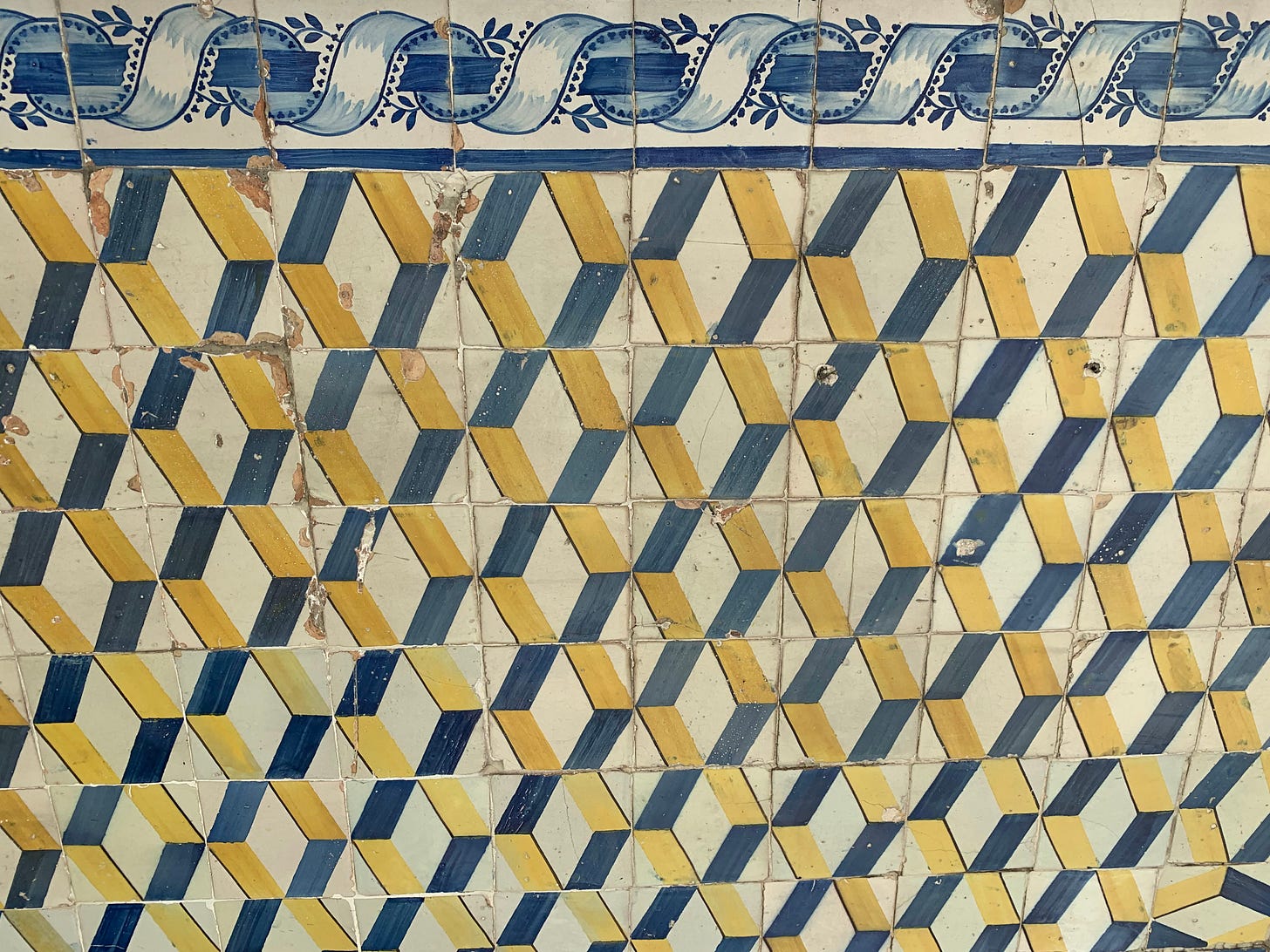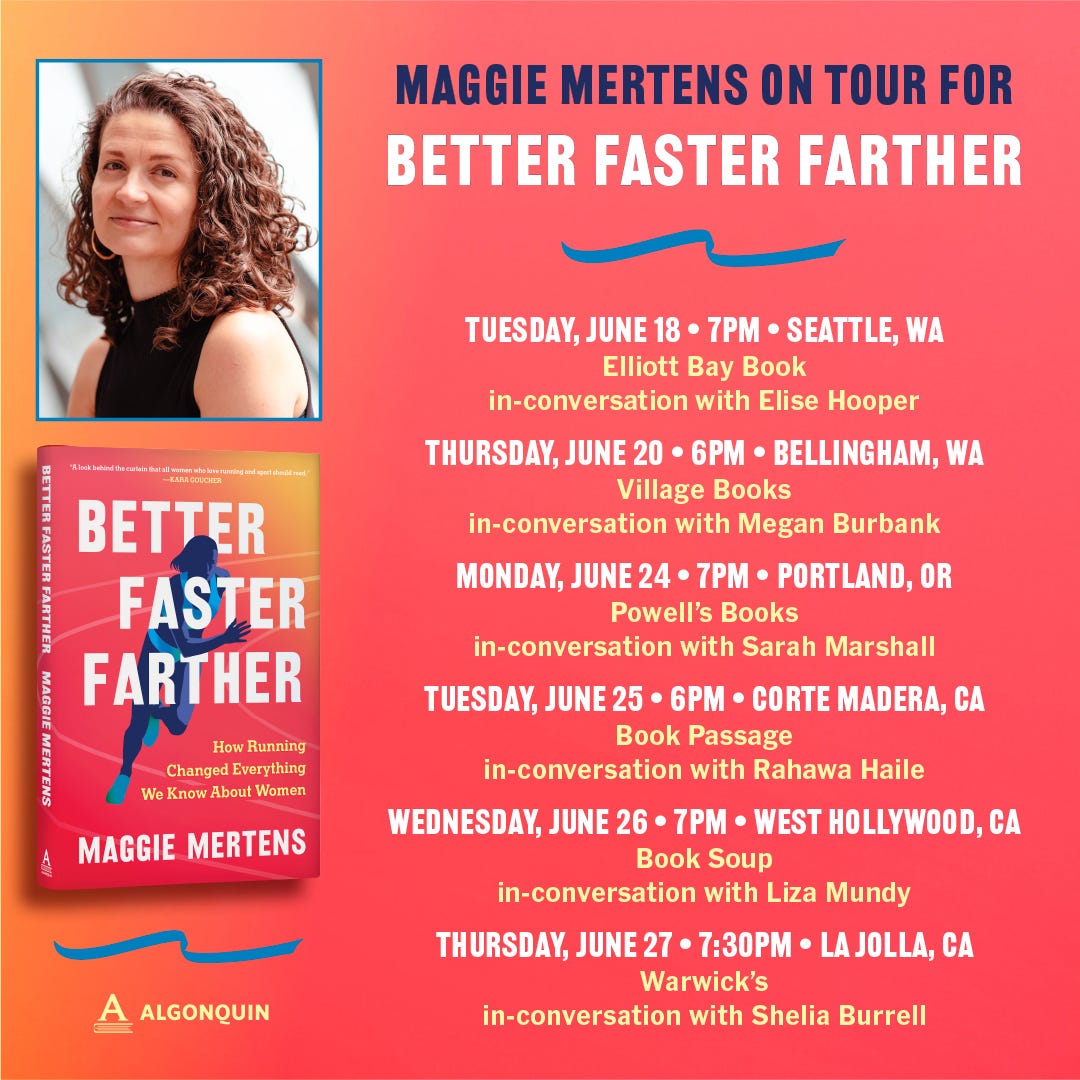How I Spent My Book Advance
AKA Letting Go of my Former "Girlboss" because capitalism is a trap
This post was originally published on
’ brilliant Substack newsletter —a newsletter featuring essays, interviews, and book reviews that wrestle with what it means to be a feminist today. This post is published with permission from Maggie and an urging that you pre-order her debut book, Better, Faster, Farther: How Running Changed Everything We Know About Women (Algonquin Books, June 18, 2024) asap! You can find her on Instagram: @maggiejmertens
Things I Paid For With My Book Advance:
Three months of a nanny share for my 6 month old
25% of the cost of one year of having two small children in daycare in the Seattle metropolitan area (4 days/week)
Hiring a cleaner to scrub my bathroom and kitchen and mop my floors once a month
Therapy co-pays. So many therapy co-pays to help me believe, yes, I could write a book
A trip to Scotland and England for book reporting
A trip to Boston for book reporting
A trip to Georgia to write in a cabin for 5 days with my writing accountability buddy and dear friend and without my children bothering me
An editorial assistant who helped me with fact-checking, source formatting, and image sourcing
Image rights to publish photographs in the book
A new laptop to replace my laptop from 2015
A new refrigerator to replace the old, falling apart, bottom of the barrel one that came with our house and had no working light
Little treats to bribe myself to finish my book chapters in a timely fashion: one pair of leather boots, a WILDFANG jumpsuit, one pair of Brooks trail running shoes, too many other little things I would buy and say were to celebrate the book but I probably would have bought anyway and have lost track of.
Some portion of the airfare and lodging for a trip to Italy and Portugal with my family to celebrate finishing the draft of my book (after using credit card points)
Several packs of CycleBar classes where I visualized people saying nice things about my book while pushing my aerobic capacity to breaking point
Beth Pickens’ Homework Club, which allowed me one Zoom meeting a month to feel like I was a true “artist”
The Peloton app, resulting in countless pep talks from Jess Sims as I lifted heavy weights in the garage in the middle of winter
A few cute outfits for my kids
My taxes
Linen sheets bought at a discount (thanks mom!)
Things I Did Not Pay for With My Book Advance:
My mortgage
Groceries
75% of the daycare costs of my children for the one year they were both in daycare, all of the daycare costs of the past year for my youngest
Car insurance
Health insurance
Retirement savings
All of the other basic necessities we need to live and remain housed and fed and insured, etc. etc.
One Sunday morning in 2010, I was in Brooklyn, wandering through book shops as I often did with my boyfriend. I have always felt strangely at home in bookstores, as though the smell of ink and glue and freshly cut paper could feed me if I were starving. I remember caressing the covers of the hardbacks, all lovingly chosen to be in places of honor on the front New Releases tables. Ass I flipped through paperbacks just to hear the sound the pages made, or to note a table of contents, or to clock a book’s structure, or to catch a peek at an author’s bio, I realized I was picking up little breadcrumbs on this particular visit — I was wondering, how do I become one of you?
I was 23 years old and had been in my first real job, a job in journalism, with a salary that had finally allowed me to rent an apartment, and move out of the house where I’d been staying essentially for free (out of the goodness of the hearts of strangers who had become good friends), for around a year. Suddenly, here I was trying to get out of it. I’d graduated from college two years prior into the worst economic recession since the Great Depression. I was broke broke broke. “Moving home,” as many millennials did during this time, wasn’t an option for me at the time. But after a summer applying to jobs and hearing almost nothing, I got an unpaid internship at NPR in Washington, DC. I somehow got there. Found this housing for free. Cashed in a couple of savings bonds I’d gotten from my grandparents as a child. And started seasonal work at Whole Foods and babysitting jobs as often as I could to buy myself groceries and metro passes. The money was dwindling, and my confidence was, too. Then I got a paid internship. Then I got a job offer. It was like a miracle. The only thing I’d ever wanted to do was write, but in this role I was fixing HTML and scheduling stories, copying and pasting text into a website, sometimes copy-editing and formatting documents, scanning news headlines and using “news judgment.”
But the books were calling to me. And I couldn’t ignore them. As I pushed open the glass door and stood on the sidewalk next to my boyfriend, deciding what to do next, I knew that I’d leave my job, the one I’d tried for so long to get, with a regular paycheck that gave me the first financial security I’d felt in years. I knew that I’d do whatever it took to write a book. I applied to MFA programs in creative writing the following month. I got in. I moved to Brooklyn and in with the boyfriend. I spent years writing a book that never became a book — or hasn’t yet anyway. Spent more years pitching agents, and meeting agents, and being turned down by agents. I got another job, as a permalancer at a big, glossy magazine. After a couple of years barely scraping by, I left it. Again, because I wasn’t writing exactly what I felt called to write and neither the paycheck nor the prestige was good enough to keep me there.
This calendar year, 2024, marks my tenth as a freelance writer. I wonder often if I could have gotten here: “a debut author,” with my first book months away, without the financial precarity I kept choosing in order to keep my writing front and center. Was I just a naive 20-something with an overblown sense of self and destiny when I decided to quit that first job? Maybe. But also, I feel like had I stayed more financially comfortable, I might not have ever done the scary thing and actually tried for this thing I’m finally achieving 14 years after that bookstore visit.
The weird thing about writing a book, or writing for prestigious national magazines, or really anything about being a freelance journalist for the past ten years is that people either assume I don’t have a real job, and I must be a glorified stay at home mom/housewife, or that I’m supremely successful because you know: books, and Sports Illustrated and The Atlantic.
The reality is somewhere in between. Could I have done this without having the partner I have? Without making the work decisions I’ve made? Probably not. But what I’ve accepted is that the balance of our financial lives could shift drastically at any moment. I don’t take the lack of a regular paycheck lightly when we have two small children and a mortgage and my husband works in journalism, too, so who knows how long this current paycheck will last. Because of this uncertainty, I think that somehow along the way I’ve managed to separate my idea of the worth of my work, and really, myself, from what I’m paid for that work.
Maybe it’s because the hardest things I’ve done haven’t had any financial payoff: gestate and give birth to two children, co-raise those children for the past six and two-and-a-half years respectively, co-found and edit a weekly regional magazine for a year and a half, and report and pitch and revise countless stories as a freelancer that have never been picked up or published.
Even the stories I’ve put the most energy and passion and insight into that have been published have almost always been those that pay the absolute least. There’s a balance I’ve learned from freelancing though, that sometimes the work you do that pays the most and you care the least about is what fuels and feeds the ability to do what you are truly driven to do. Because payment from work doesn’t only come in the form of money, sometimes it arrives in other things you need to survive: confidence, love, fascination. Do they pay the bills? No. Can they sustain you? Yes.
Freelancing is a strange financial situation in which you basically live off of a credit card and pay for all your work expenses upfront and do all the work and then maybe a month or two or three after you’re done with the work, you get paid and you can pay your debts and pay your bills. Usually it’s not nearly enough. Living off of a book advance is also a strange financial situation in which you receive a set fee, an advance of the hypothetical royalties from book sales, split into three chunks while you work on the book. But in some ways receiving money this way for my work was a validating shift for me. Because of when I signed and turned in my manuscript, I received one-third of my book advance in 2022 when I signed; one-third in 2023 when I completed the manuscript; and the final third I’ll receive this year when the book is published.
My advance was by no means huge, but it wasn’t nothing, either. For the past two years, I’ve still made less per year than in those early years of freelancing, pre-kids, or any of my “full-time” jobs, which was never more than $50,000. But the majority of my book income comes in one big chunk as opposed to little drips all through the year. And perhaps most importantly: I got those big chunks before I’d done all of the work. The payment, in other words, felt like an investment in my work, up front. The publishing industry may be in turmoil, but to me, getting in the door has been a gift. This industry, unlike freelance journalism, seems to care a bit more about those who actually produce the work they depend on. Those book advance payments have been a psychological boost for me, an external validation that this project of mine did have real value.
In this strange capitalist world in which money really doesn’t make sense — societal value is almost never reflected in salary, so many artists never see a financial boon from their work, no one knows how the book industry is actually doing, and for-profit journalism has been collapsing for decades — regaining some modicum of balance between a financial gain and the work I’ve put into something, the care I’ve put into a project, the achievement of a dream I have left so many other jobs and potential financial stability for, is kind of unbelievable. But it isn’t really about the money, it’s about having had a small group of people look at me, and my work, and decide to invest in me. That has been life-changing.
Maggie Mertens is a writer, journalist, and editor in Seattle. Her essays and reporting have appeared in The Atlantic, NPR, Sports Illustrated, ESPNw, Glamour, Pacific Standard, Refinery29, and Creative Nonfiction, among others. Her book Better Faster Farther: How Running Changed Everything We Know About Women will publish in June 2024. In addition to preordering Maggie’s book, you can see her in person on her book tour!





